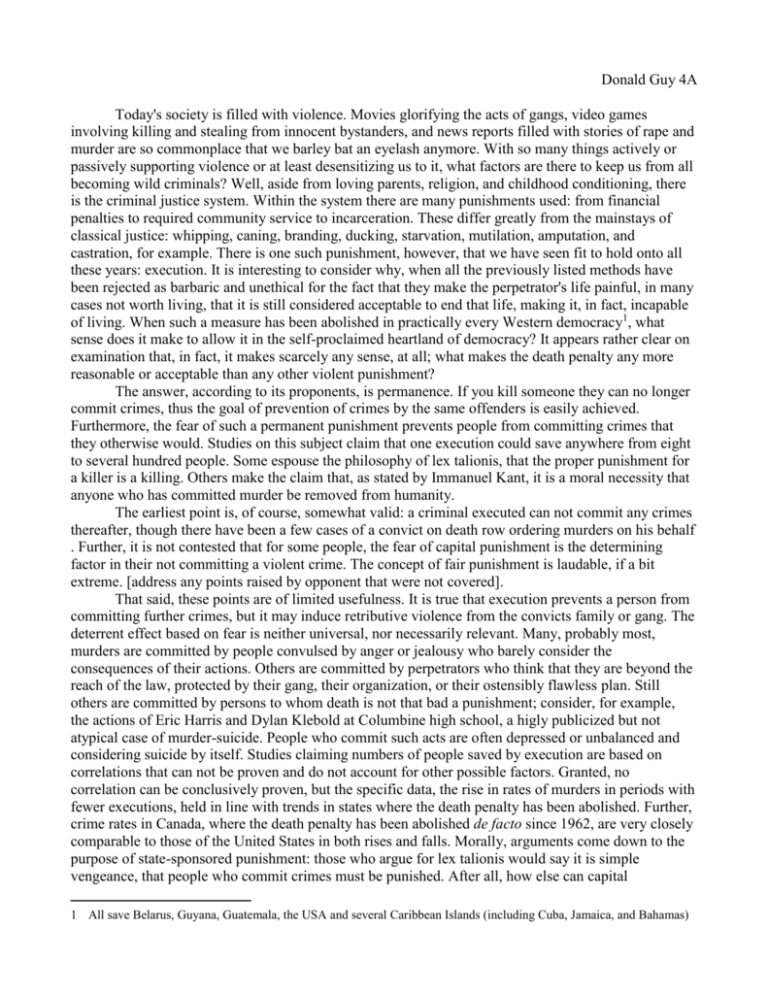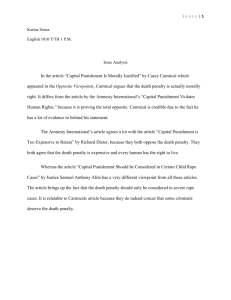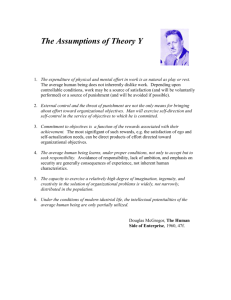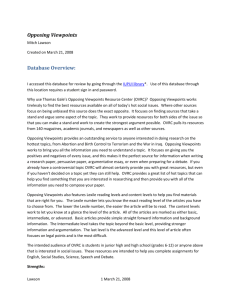debate - Donald Guy`s WIP Project
advertisement

Donald Guy 4A Today's society is filled with violence. Movies glorifying the acts of gangs, video games involving killing and stealing from innocent bystanders, and news reports filled with stories of rape and murder are so commonplace that we barley bat an eyelash anymore. With so many things actively or passively supporting violence or at least desensitizing us to it, what factors are there to keep us from all becoming wild criminals? Well, aside from loving parents, religion, and childhood conditioning, there is the criminal justice system. Within the system there are many punishments used: from financial penalties to required community service to incarceration. These differ greatly from the mainstays of classical justice: whipping, caning, branding, ducking, starvation, mutilation, amputation, and castration, for example. There is one such punishment, however, that we have seen fit to hold onto all these years: execution. It is interesting to consider why, when all the previously listed methods have been rejected as barbaric and unethical for the fact that they make the perpetrator's life painful, in many cases not worth living, that it is still considered acceptable to end that life, making it, in fact, incapable of living. When such a measure has been abolished in practically every Western democracy1, what sense does it make to allow it in the self-proclaimed heartland of democracy? It appears rather clear on examination that, in fact, it makes scarcely any sense, at all; what makes the death penalty any more reasonable or acceptable than any other violent punishment? The answer, according to its proponents, is permanence. If you kill someone they can no longer commit crimes, thus the goal of prevention of crimes by the same offenders is easily achieved. Furthermore, the fear of such a permanent punishment prevents people from committing crimes that they otherwise would. Studies on this subject claim that one execution could save anywhere from eight to several hundred people. Some espouse the philosophy of lex talionis, that the proper punishment for a killer is a killing. Others make the claim that, as stated by Immanuel Kant, it is a moral necessity that anyone who has committed murder be removed from humanity. The earliest point is, of course, somewhat valid: a criminal executed can not commit any crimes thereafter, though there have been a few cases of a convict on death row ordering murders on his behalf . Further, it is not contested that for some people, the fear of capital punishment is the determining factor in their not committing a violent crime. The concept of fair punishment is laudable, if a bit extreme. [address any points raised by opponent that were not covered]. That said, these points are of limited usefulness. It is true that execution prevents a person from committing further crimes, but it may induce retributive violence from the convicts family or gang. The deterrent effect based on fear is neither universal, nor necessarily relevant. Many, probably most, murders are committed by people convulsed by anger or jealousy who barely consider the consequences of their actions. Others are committed by perpetrators who think that they are beyond the reach of the law, protected by their gang, their organization, or their ostensibly flawless plan. Still others are committed by persons to whom death is not that bad a punishment; consider, for example, the actions of Eric Harris and Dylan Klebold at Columbine high school, a higly publicized but not atypical case of murder-suicide. People who commit such acts are often depressed or unbalanced and considering suicide by itself. Studies claiming numbers of people saved by execution are based on correlations that can not be proven and do not account for other possible factors. Granted, no correlation can be conclusively proven, but the specific data, the rise in rates of murders in periods with fewer executions, held in line with trends in states where the death penalty has been abolished. Further, crime rates in Canada, where the death penalty has been abolished de facto since 1962, are very closely comparable to those of the United States in both rises and falls. Morally, arguments come down to the purpose of state-sponsored punishment: those who argue for lex talionis would say it is simple vengeance, that people who commit crimes must be punished. After all, how else can capital 1 All save Belarus, Guyana, Guatemala, the USA and several Caribbean Islands (including Cuba, Jamaica, and Bahamas) punishment be justified as better then life imprisonment. Those against it, on the other hand, tend to believe that the purpose of punishment is more rehabilitative: to make criminals, if possible, functional members of society and barring that make them understand what they did was wrong, lead them to feel remorse, and keep them in an orderly, somewhat productive capacity. It is because of this theory, that we hold that capital punishment ought to be abolished in favor of punishments with corrective potential and without pointless and unproductive revenge that, by its very nature, promotes further violence. In the case where a murder was committed in anger or jealousy it is very possible that the perpetrator already feels remorse and would not have resorted to such measures were they in a more rational frame of mind. Because they knew and had a relationship of some sort with the victim it is very likely that they are very sorry for their actions and would not have done it given the option. Are these people inherently evil for having done such a thing? There are many sources to consider on such an issue. Psychologically, it is possible that they were temporarily insane, unsure of right and wrong; in a Freudian frame, their id may have overcome their ego and superego so that they were drawn to a primal desire for revenge (an analysis which could also be applied to communal approval of an execution for such a perpetrator). It is very possible that such a person has been horrified by their own actions and is perfectly capable of rehabilitation and return to societal functioning. Those who kill in such a situation or ones of extreme depression are perhaps more deserving of therapy then death. Perhaps others lives have less value left, but regardless, the problem is not killing them so much as killing at all. Taking vengeance only creates a society in which vengeance is highly valued. There is a reason we progressed from the times when insults begot duels in the streets: sophistication; civilization. Society has evolved beyond the need to use violence to settle problems. Killing, even killing criminals, is still promoting killing. Be it Karma, the Ten Commandments, the Golden Rule, the Wiccan Rede, Natural Law Theory or even Legal Positivism with the government as sovereign, hurting people is wrong, killing people is wrong. There can be cases made about its effectiveness as a deterrent, its racially and socioeconomically fair application, and its prevention of further crime, but all told its comes to a simple point: the state killing is wrong, even if it is done for the so-called right reasons. Donald Guy 4A Works Consulted Death Penalty Information Center. 22 Mar. 2007. 22 Mar. 2007 <http://www.deathpenaltyinfo.org/>. "Does the death penalty deter?." The Wilson Quarterly. 30. 3 (Summer 2006): 77(2). Opposing Viewpoints Resource Center. Thomson Gale. Ocean Lakes High School. 28 Mar. 2007 <http://find.galenet.com/ovrc/> Dutta, Sunil. "Capital Punishment Cannot Be Justified." Capital Punishment. Ed. Mary E. Williams. Current Controversies Series. San Diego: Greenhaven Press, 2005. Opposing Viewpoints Resource Center. Thomson Gale. Ocean Lakes High School. 22 Mar. 2007 <http://find.galegroup.com/ovrc/>. Grant, Robert. "Capital Punishment Exacerbates Violence." Capital Punishment. Ed. Mary E. Williams. Current Controversies Series. San Diego: Greenhaven Press, 2005. Opposing Viewpoints Resource Center. Thomson Gale. Ocean Lakes High School. 22 Mar. 2007 <http://find.galegroup.com/ovrc/>. Green, Frank, and Tyler Whitley. "Death-penalty expansion vetoed." Richmond Times-Dispatch 27 Mar. 2007. TimesDispatch.com. 27 Mar. 2007. 28 Mar. 2007 <http://www.timesdispatch.com/servlet/Satellite?pagename=RTD%2FMGArticle%2FRTD_Bas icArticle&c=MGArticle&cid=1173350423557&path=!news&s=1045855934842>. Rosenberg, Paul H. "The Death Penalty Increases the Violent Crime Rate." The Death Penalty. Ed. Mary E. Williams. Opposing Viewpoints. San Diego: Greenhaven Press, 2002. Opposing Viewpoints Resource Center. Thomson Gale. Ocean Lakes High School. 28 Mar. 2007 <http://find.galenet.com/ovrc/>. Tucker, William. "Capital Punishment Should Not Be Abolished." Criminal Justice. Ed. Tamara L. Roleff. Opposing Viewpoints. San Diego: Greenhaven Press, 2004. Opposing Viewpoints Resource Center. Thomson Gale. Ocean Lakes High School. 28 Mar. 2007 <http://find.galenet.com/ovrc/>. van den Haag, Ernest. "Capital Punishment Should Be Retained." Capital Punishment. Ed. Mary E. Williams. Current Controversies Series. San Diego: Greenhaven Press, 2005. Opposing Viewpoints Resource Center. Thomson Gale. Ocean Lakes High School. 28 Mar. 2007 <http://find.galenet.com/ovrc/>.







